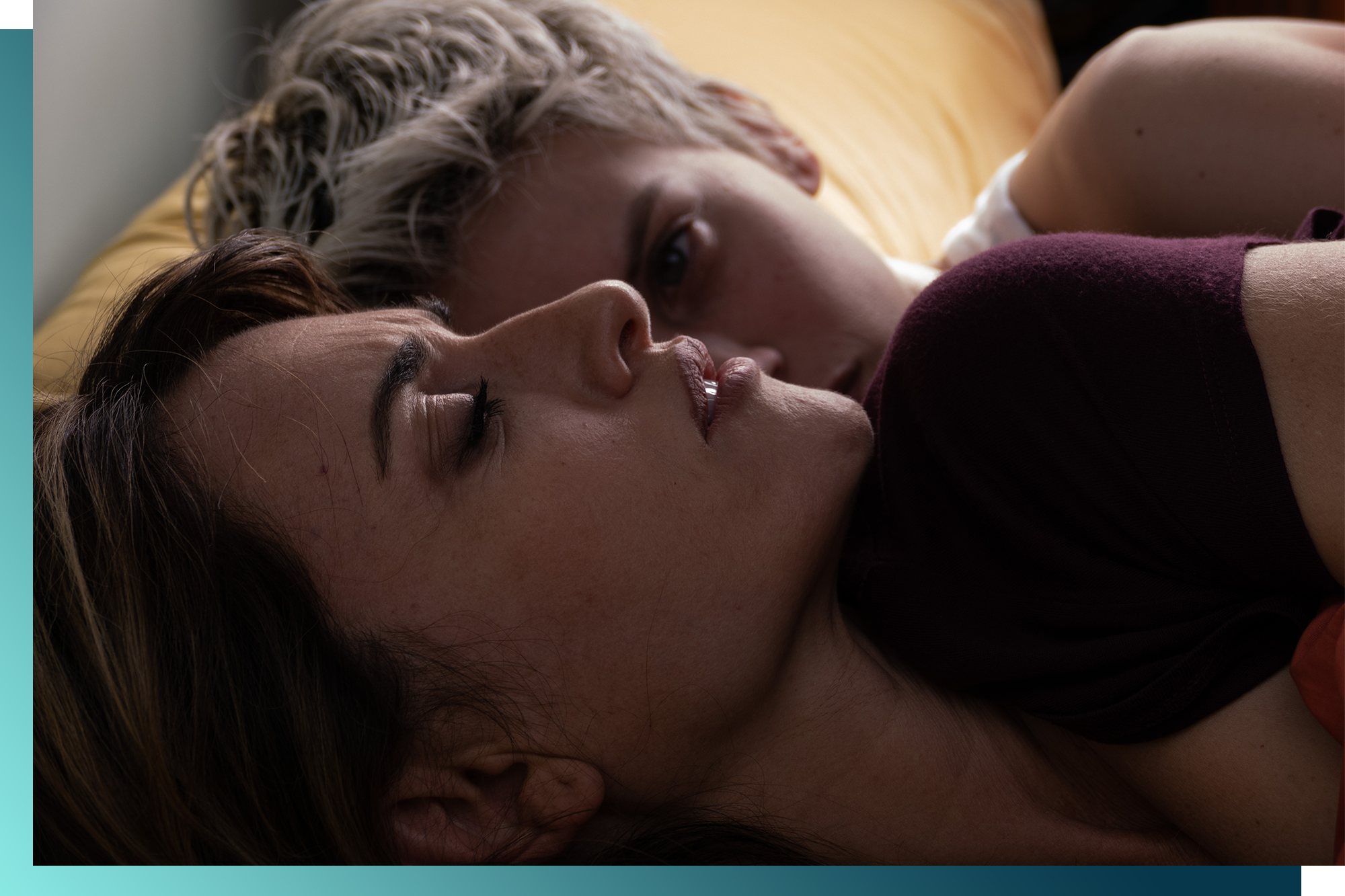How do you move on from the most personal project you’ve ever made? For Pedro Almodóvar, the answer lurked in the past. Writing Pain and Glory, a semi-autobiographical portrait starring Antonio Banderas, required great emotional investment for the Oscar-winning filmmaker: “I felt dizzy, I felt vertigo…. It’s something I’d never done before.” But having made more than 20 movies over a four-decade-plus career, he’s long realized that cinema is his life. So he dove right back into his life’s work—specifically, a screenplay draft nearly 10 years old. He was approaching it anew, however: as a changed, ever-evolving artist.
Almodóvar finds his films getting deeper, citing a “tipping point” with 2016’s Julieta. “They’re starker, more austere, less baroque,” he tells me through a translator over Zoom. “I think that change has surprised people.”
I ask him if, at this late phase of his career, such renewed attention has felt surprising to him. “Am I at the end of my career?” he asks with a booming laugh. “My God.”
In fact, it feels more like he’s just getting started again. And it’s not like one of the world’s most highly regarded directors needed to step it up. In addition to his original-screenplay Oscar (for 2002’s Talk to Her), the 71-year-old Almodóvar has won five Goya Awards in his native Spain; best director and best screenplay prizes from the Cannes Film Festival; and five BAFTA awards. But Almodóvar is a restless filmmaker, not content to repeat himself, constantly focused on expanding the boundaries of his storytelling.
In its melancholy inward turn, Pain and Glory marked a kind of radical, thrilling departure. By digging the script for Parallel Mothers out of a drawer for his next feature, he returned to his signature theme of the maternal and his signature style of colorful, bold, twisty melodrama. These Almodóvarian hallmarks developed out of his own upbringing, surrounded by powerful women he admired and adored. And as he’s gotten older, he’s developed a greater interest in these heroines’ flaws, the moral dilemmas they might face. Enter Parallel Mothers—which, over three months in quarantine, he rewrote almost entirely. “All of my mothers have been a kind of force of nature—natural fighters, no prejudices,” Almodóvar says. “I try not to repeat things I did in the past…. That kind of imperfection, which is very real too, attracted me more than ever before.”
What Almodóvar fans can comfortably expect from Parallel Mothers is a rich, affectionate dynamic between its two main women—Janis (Penélope Cruz), a magazine photographer who embarks on an affair with a forensic anthropologist, and Ana (Milena Smit), a teenager harboring a secret. Through their various experiences, they wind up in the same maternity ward, pregnant and destined for single-motherhood—which elates Janis and terrifies Ana. After a complication, the two women are bound more inextricably than either could have foreseen—with Janis, eventually, in the position of holding a critical revelation from her new, vulnerable friend.
What’s less expected is the way the film’s scope expands, generously and provocatively—to Ana’s own mother (Aitana Sánchez-Gijón), an aspiring actor whose narcissism belies the ambivalence and regret she feels as a parent, and to Janis’s family history, the traumatic legacy of the Spanish Civil War which has kept her searching for answers her whole life. “I’m talking about mothers who are alone—it’s not just that they’re single mothers but they’re alone with themselves as well,” Almodóvar says. “I don’t think I’d ever really talked so much about that loneliness.”
With sparkling production design—weaving between modern Madrid and the rural village of Janis’s family—and the haunting dramatic score from Alberto Iglesias, Parallel Mothers wraps an uncommonly thorny narrative in a typically bright and playful package. The key to tying it all together? The star who made her Almodóvar debut nearly 25 years ago, and has now, in their seventh and greatest collaboration, reached a new career high.
Penélope Cruz remembers the first time Almodóvar called her: She was 18 years old, and he said over the phone that she should expect to be cast in one of his films before too long. She’d already idolized him growing up; to her, he represented a “freedom” in his artistic expressions. “When I was little, I thought, ‘This is a man that should be president,’” she recalls with a laugh.
In the years since, the 47-year-old Cruz has played many an Almodóvar mother: to tragic results, in 1999’s All About My Mother; to her first Oscar nomination, in 2006’s Volver; and, via flashbacks, to fascinatingly memoiristic ends in 2019’s Pain and Glory. Almodóvar closely tracks the progression of their relationship throughout our conversation. An example: “In All About My Mother, Cecilia Roth’s character almost adopts the character played by Penélope Cruz,” he says. “Funnily enough, in Parallel Mothers, it’s Penélope Cruz’s character who practically adopts Ana…with far more consequences.”
Also funnily enough: The first time Almodóvar brought Parallel Mothers up to Cruz was during a press day for All About My Mother, decades ago in New York. (“It’s changed a lot” since then, Cruz deadpans now.) The next time she heard about it was on one of their regular FaceTime calls during the early days of COVID-19 lockdown, not long before shooting would begin. “We grew up together…I know her so well,” Almodóvar says. “She has a blind faith in me…so I can dare to write more complex characters for her.” Cruz agrees, telling me, “You can feel the energy on the set. I know if he’s slept, if he’s nervous about something—before he even says, ‘good morning.’ [Same] for me with him. I cannot lie to him. I cannot hide anything from him.”
Cruz won the Volpi Cup for best actress at the Venice Film Festival, where Parallel Mothers premiered, and dedicated the award to her director and friend. “What I said is what I meant about it being 100% Pedro’s,” Cruz says, still processing her win. “The way he has written me, the way he has directed me, the things that he gets out of me…” She trails off for a moment. “It’s difficult for me to talk about him as someone that I work with, because my life would have been so different—without him in my career, and without him in my personal life.”
Almodóvar believes this is Cruz’s finest performance to date (it’s worth noting, many critics agree). He’s firm about this, in part, because he knows how much effort it took to get both of them there. With Banderas, another regular of his films, Almodóvar doesn’t bother with much rehearsal; he knows the actor likes to find the material spontaneously. Not so with Cruz. “Penélope needs that time to get into contact with the character,” Almodóvar explains. “She has gut reactions to things. In all the experience she’s had as an actor, she hasn’t ever developed a specific technique or tool to work on a character. She just needs to live in the character. To get to that extreme point, we have to rehearse. We have to rehearse over and over again.”
“It was not an easy character,” Cruz says. Over months of prep, she and her director went straight through the script repeatedly, hours at a time. “I was aware of how difficult it was going to be for her,” Almodóvar says. “She got there through sheer hard work.” The trickiness of Janis—deceiving those she cares about while confronting her own maternal traumas—led Cruz down an intense path. She’d start bursting into tears as they broke each scene; Almodóvar pushed to “drain” her of those tears, dry them out—putting her in touch with a woman who was out of touch with her emotions.
“There’s not a lot of people like him, in terms of taking care of that rhythm, of things having to take their time,” says Cruz. “We humans need time to process things in a way that is not just through our minds, but also through ourselves, our emotions, our entire system.” By the end of filming and after digesting the experience, the actor related to Janis in a way she never expected. “I didn’t want to ask myself that question when we were shooting the movie, and Pedro also never asked me,” Cruz says. “We assume…I would have been very different. But maybe not. I understand everything [Janis] does. He wrote it in such a way that it’s impossible not to understand her.”
Parallel Mothers is bookended by epic historical tragedy: the unmarked, mass graves of Janis’s great-grandfather and his family, victims of the brutal Franco regime and representative of larger, ongoing national pain. “When I tried it out [in the script], I found that it really took over every single scene,” Almodóvar says. “It just overwhelmed any other subject matter that came up.” The contrast of Janis denying her inner truth while pursuing her family’s greater truth adds texture through to the last shot, a paean to sisterhood familiar within Almodóvar’s filmography. “The movie is this beautiful homage to the imperfections of all these three different mothers,” Cruz says. “I love that.”
Put another way, we see the director finding a greater context for the ideas and images that define his films. “I feel exactly the same passion to make a movie as when I was very young,” Almodóvar says now. “The problem is that I’m not so young.” He can’t move around as much, he admits, and so he needs to select his projects more carefully—even though he keeps reading over old scripts, as he did with Parallel Mothers (and, before that, other titles like Talk to Her and Julieta). “They need a certain amount of cooking time to come to a boil, until I’m ready to actually go ahead with them,” he says. He won’t say what might be next in line.
In the meantime, coming off the acclaimed, Tilda Swinton–starring short The Human Voice, Almodóvar will return to the bite-sized format for his next project. It is, once more, unlike anything Almodóvar has done before: a Western with two male leads, closely adhering to the tenets of the format. (Almodóvar seems to smirk at the very word Western every time he says it.) “This is a genre I never thought I could do,” he says, grinning. Yet here we are; he’s already written it.
But this is still Almodóvar we’re talking about. “It will be done very much in my own way, with my own rules,” he says. “It will be done differently.” As if we’d expect anything less.
Parallel Mothers makes its U.S. premiere in October, as the closing-night event at the New York Film Festival. Sony Pictures Classics will release the film in select theaters December 24. This feature is part of Awards Insider’s exclusive fall movie coverage, featuring first looks and in-depth interviews with some of this coming season’s biggest contenders.
— At Long Last, Jane Campion Returns to Film With The Power of the Dog
— The Kominsky Method: When Paul Reiser Didn’t Recognize Paul Reiser
— How Seth Meyers Turned Internet Toxicity Into Emmy-Nominated Gold
— RuPaul’s Drag Race Changed Television—And the World
— Jason Sudeikis and Elizabeth Olsen on Entering the World of Streaming
— Sign up for the “Awards Insider” newsletter for must-read industry and awards coverage.


